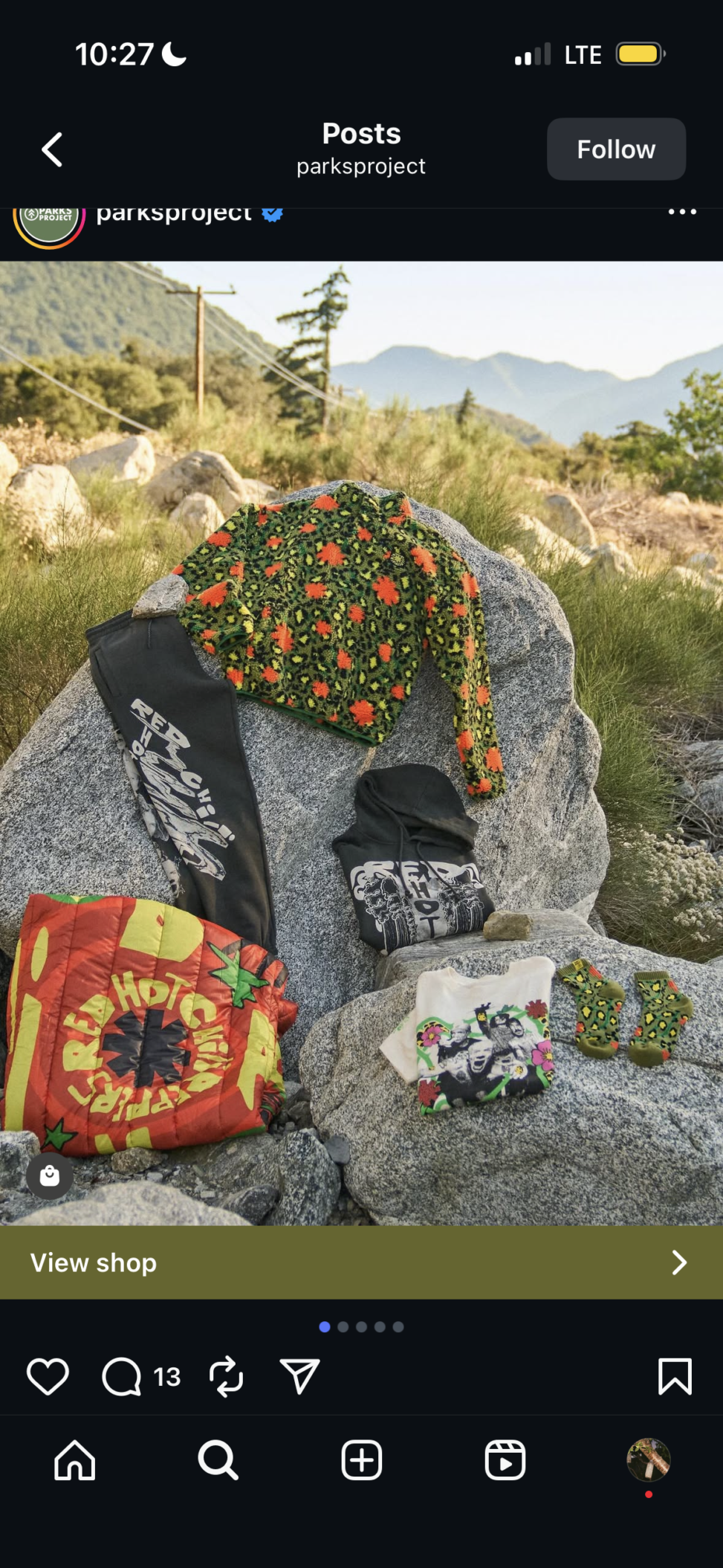Parks Project is a brand dedicated to habitat restoration and environmental responsibility, funding its mission through the sale and sustainable production of apparel and accessories. Their branding often blends lifestyle with broader social conversations and environmental commitments. The advertisement in question was posted to the official Parks Project Instagram page: @parksproject. It demonstrates how the company engages with its young costumers on a platform known for both fashion/lifestyle trends and social commentary. The still image is promoting the brands new clothing drop and collaboration with the Red-Hot Chilli Peppers. Rather than relying on copy or slogans, the ad trusts the visual composition of the image to carry its message.
The composition reinforces the brands earthy aesthetic by staging their products directly in nature. The image is shot with a medium aperture, most likely f/5.6, allowing a larger foreground for the clothing and a blurry background filled with mountains, rocks and trees. The plain grey rock provides a natural, minimal backdrop that highlights the clothes without using artificial sets. The lighting of this image also holds significance; while the background is brightened by harsh sunlight the clothing was shot in a natural, soft shade. This gave the image a nostalgic but professional and cinematic quality. Although the background is blurry and distant, the lighting brings attention to it without distracting too much from the clothes, an effective balance. The grain and warm tones of green, orange, and yellow, imitate the new-wave film photography style, situating the ad within a cultural aesthetic popular among a younger audience who tend to prefer authentic and candid imagery. (1) A telephone pole is visible in the left corner, likely included to symbolize the connection between humanity and nature. The company’s focus is on parks as accessible spaces that welcome travellers and casual visitors, rather than rugged, backcountry adventures. The ad promotes a leisurely and approachable way for everyone to engage with the outdoors – the catch? You just have to buy their clothes.
Using all these elements, the ad adheres to a specific lifestyle shared by their target audience. It tells you that these are not fragile, high-fashion garments but instead durable and comfortable clothes designed to be lived in. Displayed organically on the rock, as though left there while swimming or hiking, the ad gives its viewers a chance to relate to and associate the image with their own memories. Unlike many clothing ads that rely on styled models and studio environment’s, Parks Project lets its funky-patterned products speak for themselves. Platforms like Instagram, are saturated with still-life images of products, gear, and even the water bottle your drinking from, feeding into a subculture that values objects and experiences over personal photos.
Finally, the advertisement is effective because it is consistent with Parks Project’s general branding. Known for collaborations with organizations like National Geographic and its partnership with many U.S. National Parks, the company has built a reputation around its environmental commitments. Since their beginnings in 2014 the company has donated over 2.7 million towards “nonprofits supporting environmental conservation, habitat restoration, and park infrastructure improvements across the U.S.”(2) Its products are not presented as an end in themselves, but as a means of supporting their mission. Parks Project appeals directly to young consumers by combining purpose-driven branding with trendy aesthetics. Their strategy is not simply to follow trends, but to influence them, offering merchandise that are both fashionable and socially meaningful.
Parks Project is a certified B Corporation, with an overall B Impact Score of 85.7 out of 100. (3) The average score for regular companies is 50.9. This assessment evaluates five key areas: governance, workers, community, environment, and consumers. The company has performed especially well in worker welfare and community engagement, ensuring employees receive fair wages and support in health, wellness and diversity initiates. They also scored highly in civic engagement and are consistent in addressing current environmental issues. All products are manufactured in California, and Parks Project holds a FSC (Forest Stewardship Council) Certification, which guarantees that their textiles come from responsibly managed forests providing environmental, social, and economic benefits. In addition, they maintain GOTS (Global Organic Textile Standard) and GRS (Global Recycled Standard) certifications. These highlight the company’s commitment to organic production, sustainable apparel manufacturing, and the use of recycled polyester. The GRS claims that “sites are required to meet strict social and environmental requirements. Chemicals with harmful potential aren’t allowed to be used on GRS products.”
Overall, Parks Project has remained true to its mission by adopting ethical and environmentally responsible production methods and reflecting that in their advertisement. The company has faced little backlash, likely because its certifications provide credible proof of their environmental and social commitments. While some costumers have raised questions about where contributions are directed, the Parks Project website outlines initiatives they contribute to under the Leave It Better Foundation. These include funding for volunteer maintenance projects, youth programs like Glacier National Park Conservancy’s Native America Speaks Program (4), trail restoration, and fire relief program funds amongst many others. As a brand, Parks Projects has successfully balanced its commercial growth with its values. By maintaining transparency, building partnerships, and expanding its audience, the company continues to deliver on its promises while cultivating a trendy but socially and environmentally conscious identity.


Hazel Chiyaka
I think Amira did very well with this advertisement. The advertisement for Parks Project, featuring a collaboration with the Red-Hot Chili Peppers, masterfully uses visual storytelling to connect with its target audience. By showcasing the apparel in a natural, outdoor setting with a shallow depth of field, the focus remains on the clothing while still hinting at the majestic natural backdrop. The lighting, described as soft shade for the clothing against a sunlit background, lends to a cinematic and nostalgic quality.
Furthermore, the grain and warm color palette evoke a popular, “new-wave film photography” aesthetic, resonating with younger consumers who value authenticity. The inclusion of a telephone pole symbolizes the integration of technology and human connection within nature, aligning with Parks Project’s message of accessible outdoor engagement. This organic presentation, far from sterile studio shots, invites viewers to envision themselves wearing durable, comfortable clothing during their own adventures, fostering a relatable and aspirational lifestyle.
Amira went on to cite more about the text which is excellent. The text highlights Park Project’s successful integration of purpose-driven branding with trendy aesthetics to engage young consumers. Their commitment to environmental and social responsibility is validated by their B Corporation status and numerous certifications (FSC, GOTS, GRS), underscoring their dedication to ethical production and sustainable materials. Parks Project demonstrates how commercial growth can align with strong values, maintaining transparency and building partnerships to cultivate a conscious brand identity.
Therefore, Amira ‘s analysis of Parks Project is insightful and well-articulated. The advertisement is good.